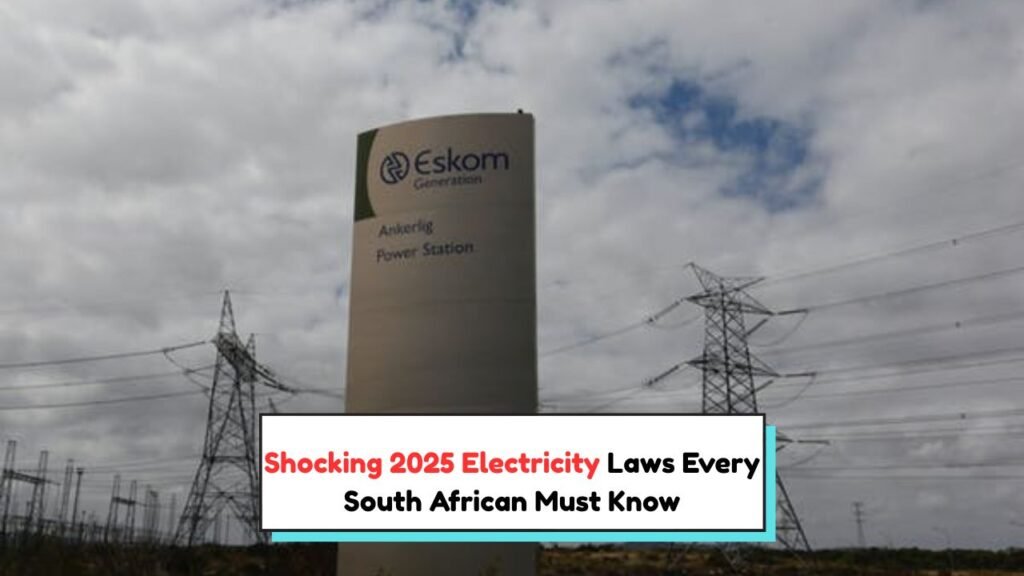South Africa 2025 Electricity Laws Overhaul: The South African government has announced a significant overhaul of its electricity laws, set to take effect in 2025. These changes aim to address the ongoing challenges within the power sector and are expected to bring about notable improvements for consumers across the nation. With the country’s energy crisis looming over its economic growth and daily life, the government has prioritized transforming the electricity landscape to ensure reliable, affordable, and sustainable power for all citizens. This comprehensive reform is poised to modernize infrastructure, encourage renewable energy adoption, and shift regulatory frameworks to better serve the public.

Consumer Benefits of the Electricity Reforms in 2025
South Africa’s 2025 electricity reforms promise a host of benefits for consumers, with improved service delivery being at the forefront. The changes are anticipated to enhance the reliability of electricity supply, reducing the frequency and impact of load shedding that has plagued the nation. By focusing on upgrading the national grid and integrating smart technology, the reforms aim to provide more consistent power availability. This modernization is expected to result in fewer outages and more stable energy prices, offering consumers a level of certainty that has been lacking in recent years.
The reforms also include provisions for increased transparency in billing processes and fairer pricing models, which are designed to protect consumers from sudden price hikes. By promoting competition within the energy market, the government intends to drive down costs and improve service quality. Furthermore, the new regulations will support the growth of renewable energy sources, encouraging households to adopt solar panels and other green technologies through incentives and subsidies. This shift not only benefits the environment but also empowers consumers to become active participants in their energy consumption.
Impact on the National Economy and Employment
The 2025 overhaul of South Africa’s electricity laws is poised to have a profound impact on the national economy. By stabilizing the energy sector, the reforms are expected to bolster investor confidence, attracting both local and international investments. This influx of capital is crucial for financing new infrastructure projects and advancing technological innovations in the energy sector. As a result, the country anticipates a boost in economic growth and job creation, particularly in the renewable energy industry.
Employment opportunities are likely to expand as the country ramps up efforts to modernize its power grid and increase its reliance on renewable energy sources. The construction and maintenance of new energy facilities, combined with the demand for skilled workers in emerging green technologies, are expected to create thousands of new jobs. Additionally, the shift towards a more sustainable energy model aligns with global trends, positioning South Africa as a competitive player in the international market. By embracing these changes, the nation not only secures its energy future but also supports sustainable economic development.
Challenges in Implementing the 2025 Electricity Reforms
While the 2025 electricity reforms in South Africa present numerous opportunities, they also pose significant challenges. One of the primary hurdles is the need for substantial investment in infrastructure upgrades and the integration of advanced technologies. The government will need to secure adequate funding and resources to ensure the successful implementation of these changes. This may involve forming partnerships with private sector stakeholders and leveraging international financial support.
Another challenge lies in the transition from traditional energy sources to renewable alternatives. This shift requires careful planning and coordination to minimize disruptions in supply and maintain affordability. The government must also address potential resistance from entrenched interests within the conventional energy sector, which may involve negotiating compromises and incentivizing cooperation. Furthermore, educating the public and ensuring widespread understanding of the benefits and responsibilities associated with the new energy model will be critical to its success.
Future Outlook for South Africa’s Energy Sector
Looking ahead, the 2025 electricity reforms are set to pave the way for a more resilient and sustainable energy sector in South Africa. The government’s commitment to modernizing the power grid and promoting renewable energy sources indicates a promising future for the country’s energy landscape. By fostering innovation and encouraging competition, these reforms are expected to drive down costs and improve service delivery, ultimately benefiting consumers and the economy as a whole.
As South Africa moves towards its energy goals, it will likely serve as a model for other nations facing similar challenges. The successful implementation of these reforms could inspire global efforts to transition to cleaner and more efficient energy systems. With the right strategies and support, South Africa’s energy sector has the potential to thrive, providing reliable power to its citizens and contributing to a more sustainable world.




